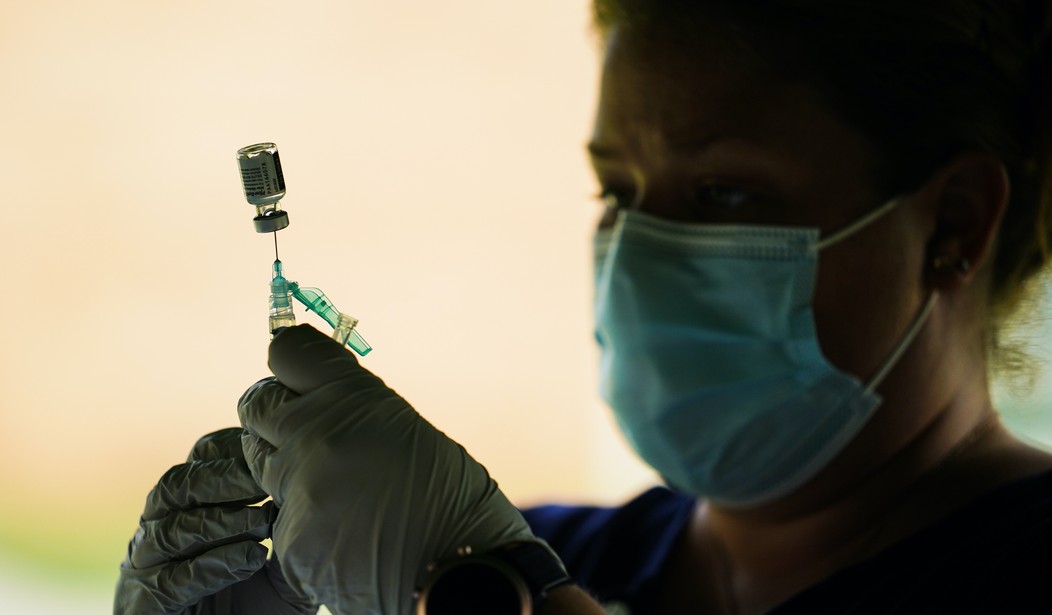A new study conducted by public health researchers at the University of North Carolina and the North Carolina Department of Health and Human Services uncovered new information on the efficacy of Pfizer's COVID-19 vaccine in young people age 5 to 11.
The research, funded in part by a grant from the National Institutes of Health, found that against the omicron variant of COVID-19, children in the study group ended up seeing negative — yes, negative — effectiveness some 20 weeks after being vaccinated after peaking between 60 and 70 percent effectiveness.
The large cohort study tracked a 6-month window of time during which omicron was the dominant strain to see what protection was given by the Pfizer vaccine and by previous COVID infection — also known as acquired immunity — against COVID infection or COVID-related hospitalization and/or death.
As notes accompanying the study's publication in the New England Journal of Medicine explain, researchers looked at 887,193 children in the 5 to 11 age group among which 273,157 received at least one dose of Pfizer's COVID vaccine and 193,346 became infected with COVID. Of the positive cases, 309 were known to be hospitalized and 7 were known to have died, according to the study's authors.
Among the conclusions researchers drew from their study, the Pfizer vaccine was less effective against omicron than it was the earlier delta variant while a combination of acquired immunity from previous COVID infection combined with vaccine-induced immunity offered the best protection:
Recommended
Among previously uninfected children, vaccine effectiveness reached 63.2% (95% confidence interval [CI], 61.0 to 65.2) at 4 weeks after the first dose and decreased to 15.5% (95% CI, 8.1 to 22.8) at 16 weeks; among previously infected children, vaccine effectiveness reached 69.6% (95% CI, 57.4 to 78.3) at 4 weeks after the first dose and decreased to 22.4% (95% CI, 13.0 to 30.8) at 16 weeks
[...]
The immunity acquired from SARS-CoV-2 infection was high, although it waned over time. Among unvaccinated children, the estimated effectiveness of omicron infection against reinfection with omicron was 90.7% (95% CI, 89.2 to 92.0) at 2 months and 62.9% (95% CI, 58.8 to 66.6) at 4 months (Figure 1C and Table S4). Among vaccinated children, the estimated effectiveness of omicron infection alone against reinfection with omicron was 94.3% (95% CI, 91.6 to 96.1) at 2 months and 79.4% (95% CI, 73.8 to 83.8) at 4 months.
Charts accompanying the survey show the effectiveness of vaccination among children who were previously uninfected and those who had COVID and received the Pfizer vaccine.
As can be seen (panel B, below), the effectiveness for all waned over time until it dipped into negative effectiveness at 20 to 22 weeks post-vaccination. That means vaccinated children in the cohort were more likely to become infected with COVID than their unvaccinated counterparts.

The researchers data is accompanied in the NEJM by notes on limitations in their study including "unmeasured confounding and underreporting of Covid-19 cases" while "waning effects of both vaccination and previous infection may have been confounded by earlier infection and earlier vaccination in high-risk children." The study also notes that "differential ascertainment of Covid-19 cases between vaccinated and unvaccinated children would bias the estimation of vaccine effectiveness."

























Join the conversation as a VIP Member